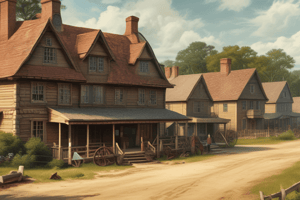Podcast
Questions and Answers
Jamestown, Virginia, was established in the year ______.
Jamestown, Virginia, was established in the year ______.
1607
The colonists were considered British citizens subject to King ______.
The colonists were considered British citizens subject to King ______.
George III
The ______ Act of 1765 required colonists to provide lodging for British soldiers.
The ______ Act of 1765 required colonists to provide lodging for British soldiers.
Quartering
The ______ Tea Party involved colonists dumping tea into Boston Harbor.
The ______ Tea Party involved colonists dumping tea into Boston Harbor.
The Declaration of Independence was ratified on July ______, 1776.
The Declaration of Independence was ratified on July ______, 1776.
The American Revolutionary War began after the ratification of the Declaration of ______.
The American Revolutionary War began after the ratification of the Declaration of ______.
The document asserting the colonies' right to self-governance is known as the Declaration of ______.
The document asserting the colonies' right to self-governance is known as the Declaration of ______.
Colonists protested against British policies by refusing to buy ______ goods.
Colonists protested against British policies by refusing to buy ______ goods.
The ______ Act of 1765 imposed taxes on printed materials in the colonies.
The ______ Act of 1765 imposed taxes on printed materials in the colonies.
The Declaration stated that all men are created ______.
The Declaration stated that all men are created ______.
Flashcards are hidden until you start studying
Study Notes
Jamestown Settlement
- England established its first permanent settlement in North America in 1607, Jamestown, Virginia.
- By the 1770s, thirteen colonies had been established, with colonists being British citizens subject to King George III.
- King George III appointed royal governors to oversee the colonies, which were considered British property.
- Colonists were required to trade with and pay taxes to Great Britain.
Colonial Resistance
- Increasing control from England led to resistance from colonists.
- The Quartering Act of 1765 required colonists to pay for or provide lodging for British soldiers stationed in America.
- The Stamp Act of 1765 imposed taxes on printed materials in the colonies, requiring them to be produced on specially stamped paper from London.
The Boston Tea Party
- Colonists protested against British policies, including refusing to buy British goods and engaging in acts of defiance.
- The Boston Tea Party, where disguised colonists dumped tea into the Boston Harbor, prompted harsh British retaliation.
- The closure of Boston Harbor and other punitive measures further fueled colonial resentment.
Declaration of Independence
- In 1775, the Second Continental Congress formed, with delegates from the colonies gathering to address grievances against British rule.
- The Declaration of Independence, drafted by a committee including Benjamin Franklin, John Adams, Roger Sherman, Robert Livingston, and Thomas Jefferson, outlined the reasons for seeking independence.
- The document declared that the American colonies would separate from British control, asserting the right to self-governance.
- The Declaration stated "We hold these truths to be self-evident, that all men are created equal, that they are endowed by their Creator with certain unalienable Rights, that among these are Life, Liberty and the pursuit of Happiness."
Independence Day
- The Declaration of Independence was ratified by the Continental Congress on July 4, 1776.
- Independence Day marks the anniversary of the declaration, signifying the birth of the United States of America.
American Revolutionary War
- The Declaration of Independence marked the beginning of the American Revolutionary War.
- The war continued until the American colonists successfully gained their independence from Great Britain.
- The colonists' refusal to surrender and their determination to resist British rule ultimately led to their victory.
Jamestown Settlement
- England's first permanent settlement in North America was established in 1607 at Jamestown, Virginia.
- Thirteen colonies were established by the 1770s, with colonists being British citizens.
- King George III appointed royal governors for the colonies.
- Colonists were obligated to trade with and pay taxes to Great Britain.
Colonial Resistance
- Colonists resisted increasing control from England.
- The Quartering Act of 1765 required colonists to pay for or provide housing for British soldiers stationed in America.
- The Stamp Act of 1765 imposed taxes on printed materials in the colonies, requiring specially stamped paper from London.
The Boston Tea Party
- Colonists protested against British policies through boycotts and acts of defiance.
- The Boston Tea Party, where disguised colonists dumped tea into the Boston Harbor, led to harsh British retaliation.
- The closure of Boston Harbor and other punitive measures further fueled colonial resentment.
Declaration of Independence
- The Second Continental Congress formed in 1775, with delegates from the colonies gathering to address grievances against the British.
- The Declaration of Independence, drafted by a committee including Benjamin Franklin, John Adams, Roger Sherman, Robert Livingston, and Thomas Jefferson, outlined the reasons for seeking independence.
- The document declared the separation of American colonies from British control and asserted the right to self-governance.
- The Declaration stated "We hold these truths to be self-evident, that all men are created equal, that they are endowed by their Creator with certain unalienable Rights, that among these are Life, Liberty and the pursuit of Happiness."
Independence Day
- The Declaration of Independence was ratified by the Continental Congress on July 4, 1776.
- Independence Day celebrates the anniversary of the declaration, marking the birth of the United States of America.
American Revolutionary War
- The Declaration of Independence marked the beginning of the American Revolutionary War.
- The war lasted until the American colonists successfully gained their independence from Great Britain.
- The colonists' unwavering determination to resist British rule led to their victory.
Studying That Suits You
Use AI to generate personalized quizzes and flashcards to suit your learning preferences.



